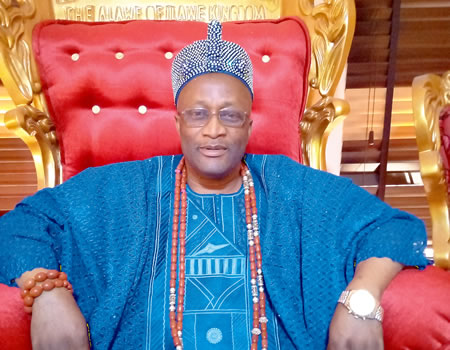The Alawe of Ilawe-Ekiti and chairman, Ekiti State Council of Traditional Rulers, His Royal Majesty, Oba Adebanji Ajibade Alabi, Afuntade 1, ascended the throne of his forefathers in 2011. In this interview by ‘YOMI AYELESO, he speaks on the controversies that trailed the launch of Operation Amotekun, the need for constitutional roles for traditional rulers, among other issues.
As the chairman of the council of traditional rulers, what has been your role in bringing the traditional rulers together in the state?
I have been doing it to the best of my knowledge and don’t forget we have about 132 traditional rulers in the state. We have been performing our statutory duties: to provide advice to government, to ensure peace in our various domains and bring development to our various communities. We are working together and although, we have our differences as human beings, our areas of agreement are far more than our areas of disagreement. I don’t subscribe to traditional rulers attacking one another publicly. I recall we had a case like that in Ekiti State and I had to exhibit a lot of circumspection for the situation not to degenerate. We have to know that he who stays in glasshouse must not throw stones. People in our communities are looking up to us. They expect us to be embodiments of peace, progress and decorum. If we air our dirty linen in public, then what is the hope for our offspring? Any issues and disagreement can be resolved peacefully and amicably.
The governors in the South West region recently responded to the security challenges by establishing Operation Amotekun and you attended the launch in Ibadan, how do you view the initiative?
When the event was ongoing on January 9 in Ibadan, I was highly elated. The launch of Operation Amotekun was received with joy and happiness by all of us because it was obvious that we had finally found a solution to the security challenge that bedeviled our region for the greater part of 2019. You will recall that mid 2019, we had serious security challenges: people were endangered, killed, women were raped; it was a terrible development that we never experienced before in the South West. And as a response to that, as a way of ending that menace, the governors resolved to launch Operation Amotekun to checkmate criminality in our zone. When in Ibadan during the launch, we were happy that at least we were able to find a solution to the insecurity that had hampered development in the South-West.
But there has been criticism and counter criticism following the launch to the extent that the Federal Government declared the outfit illegal and unconstitutional. What do you think is the cause of the controversy about the new outfit?
I will put that controversy on lack of nationalism. Some of our people in Nigeria are not nationalistic. Any novel action taken for development, people have the tendency of reading ethnic and tribal meanings into it, otherwise there won’t have been any reason for the negative reaction that the Operation Amotekun generated. People refused to look at the reasons behind that ingenious idea; they have put ethnic and tribal colourations to it, which is not right. Operation Amotekun has no ethnic or tribal perception; it is not going to work on ethnic profiling. The only set of people that should be afraid now are bandits, kidnappers and rapists. In the South West, we have a history of being pacesetters, not only in Nigeria, but in Africa. You will discover that the first television station in Nigeria and sub-Saharan Africa was launched in that same Ibadan by the late Chief Obafemi Awolowo. When he was doing it that time, people were apprehensive and wondering what he was up to with Western Nigeria Television station, but today you can imagine the revolution it has brought to our society.
Look at the first Olympic-size stadium ever built in Nigeria, the Liberty Stadium, was equally built by Chief Obafemi Awolowo in Ibadan. The tallest building in Nigeria, even in Africa was put up in Ibadan which is the Cocoa House. We always look inward to proffer solutions to our internal problems. The South-West people are very patriotic; they are very altruistic, they believe in the Nigeria agenda. People should not put any ethnic meaning into Operation Amotekun. I read a lot of things and I was so shocked. Some people even said it was an attempt to form the Republic of Oduduwa, to secede. I don’t think any other ethnic group is more patriotic in Nigeria than the Yoruba. We hold this country together with our sense of patriotism and we will continue to be loyal to the Federal Republic of Nigeria. There should be no apprehension because there is no ulterior motive behind Operation Amotekun. The main and only motive behind the outfit is to ensure security in the South-West.
Going forward now on Operation Amotekun, what will be your advice to the governors?
There are certain things that should be done before the eventual commencement of the operation. I think that is what the governors are doing now; they are crossing the ‘ts’ and dotting the ‘is’ and as soon as this is done, the operation will roll out in full swing. I am highly delighted that the governors have been able to speak to the Federal Government to have a better understanding of the motive behind Amotekun. You will recall that the governors did not alienate the Federal Government during the initial plan.
In August 2019, we had a security summit in Ibadan where we mapped out strategies for the outfit. I remember I was there and also the Inspector General of Police was present, topmost traditional rulers were there and we were able to rub minds to come out with the idea that will complement the efforts of the police over security issues in this country. That was how we came about Amotekun. The Federal Government had been carried along from the beginning because we have governors that are well informed and intellectually endowed. They won’t just go into such issue without doing their background check. But I want to believe that the advent of social media led to what I will call conflagration and the scaring perception people are attaching to Operation Amotekun.
Looking at our peculiarities in the country, are you of the opinion that there should be constitutional roles for traditional rulers?
In the past, before independence, traditional rulers were playing very prominent roles in the day to day running of our communities. We cannot say that because of westernisation and globalisation, we will not have roles for traditional rulers. They need to be involved constitutionally because they will be accountable for whatever happens in their various localities. If you don’t give me an assignment, if there is a flaw, you can’t hold me responsible and accountable. The traditional rulers are the closest people to the grass roots. If anything is happening in any community, you get to know from the traditional rulers. You don’t need to solicit intelligence from the people; they pass everything to you in the palace. This will help government in policy formulation, policy implementation and whatever actions they want to take to ensure peace and progress in our various communities. There is need for constitutional roles for traditional rulers. I want to urge the Federal Government to as a matter of urgency convoke a security summit for people from the different zones to come together and evaluate the current insecurities in the land and postulate solutions. This, I believe, will remove the mutual suspicion that we have now in the country. Security cannot be the exclusive right of the Federal Government.






